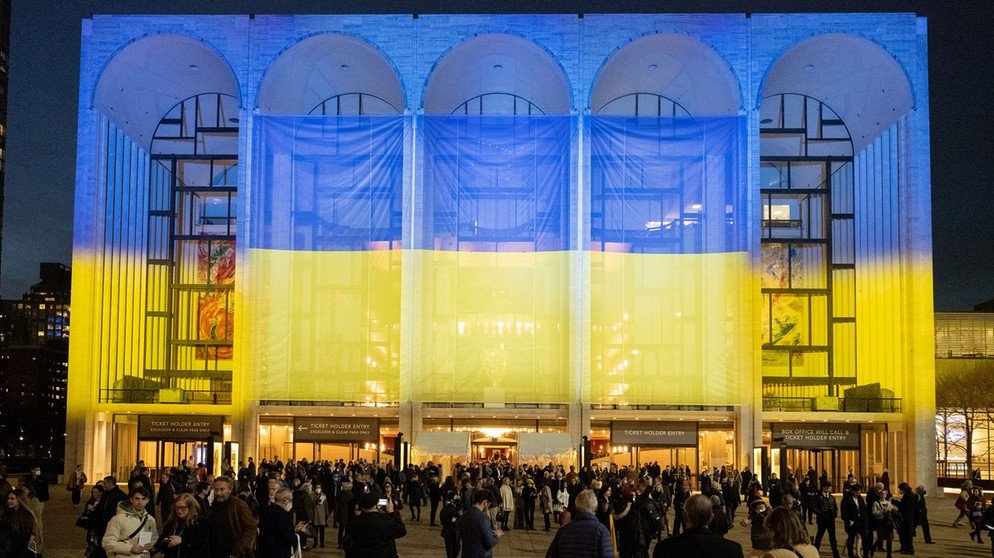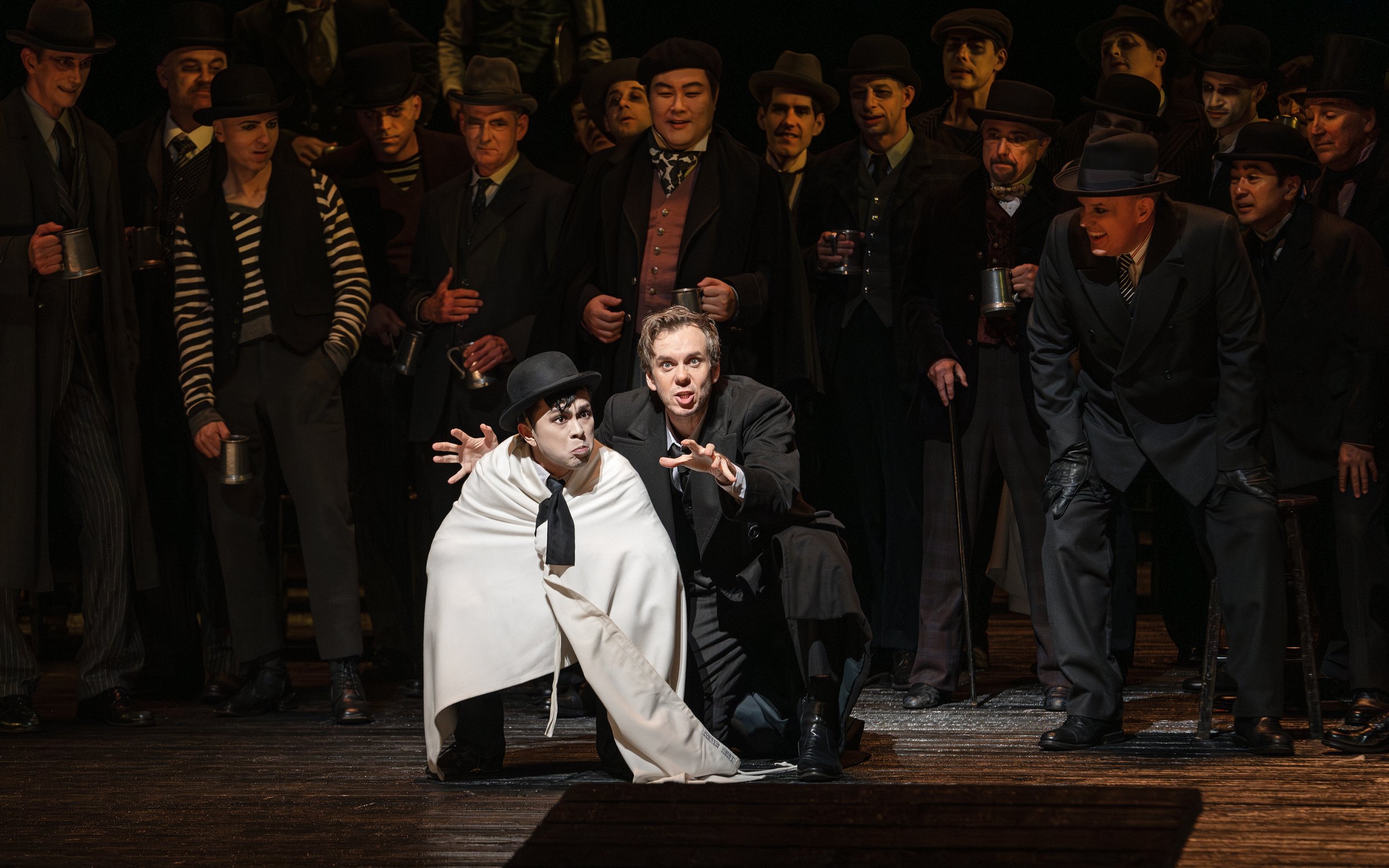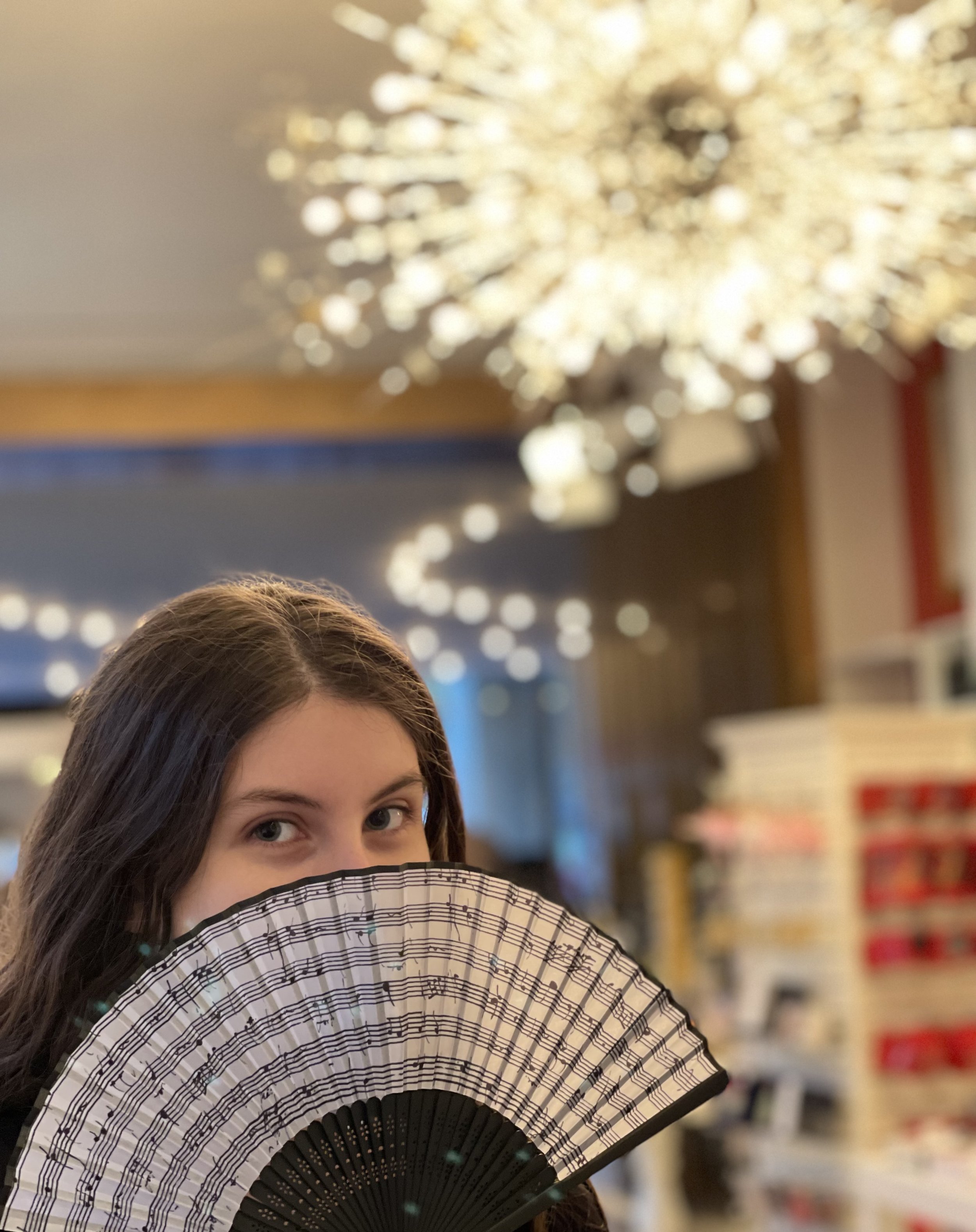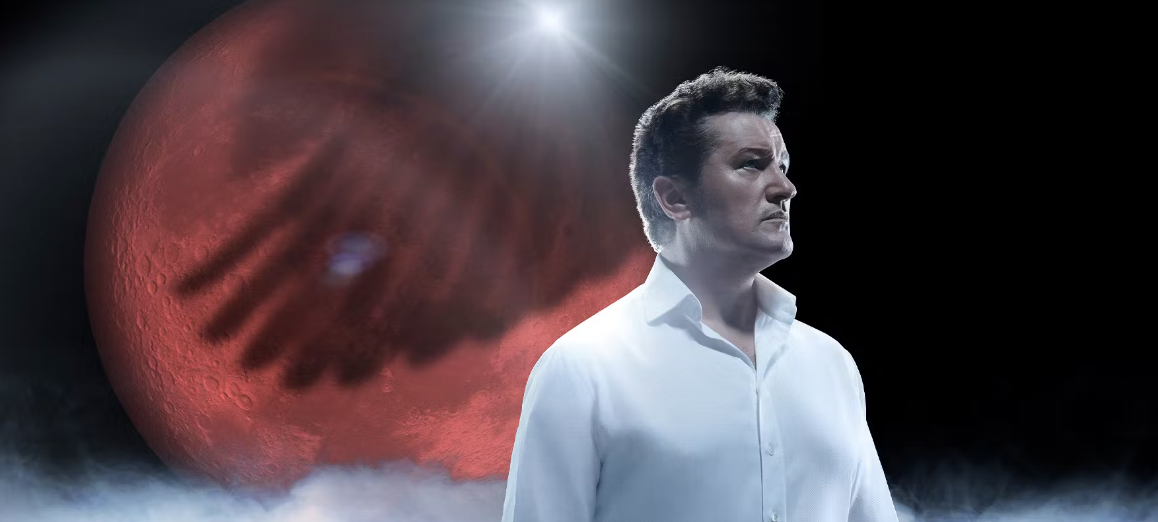Opera and Ukraine: Soldiers of Music
The Met lights up with the Ukrainian flag (Jonathan Tichler/Met Opera)
Ukraine celebrates its Independence Day today, 32 years after it became independent from the Soviet Union. Sadly, even after 32 years as a free nation, its people are still fighting to keep their liberty. Since Russia invaded Ukraine on February 24, 2022, the free world has rallied to Ukraine’s side. As Russia’s tanks rolled into Ukraine and made for Kyiv, and sandbags surrounded the Odesa Opera House, the world that looked the other way with the 2014 annexation of Crimea woke up, watched, and listened.
The opera world, too, snapped into action immediately, with stars like Lise Davidsen, Sonya Yoncheva, Piotr Beczała, Anita Rachvelishvili, and Nadine Sierra denouncing the war. The Met has been steadfastly wonderful to Ukraine from the beginning. On February 23, the day before the invasion, Peter Gelb, the Met’s general manager, was in Moscow to see the dress rehearsal of the Met’s new Lohengrin, a co-production with the eminent Bolshoi Theatre. By the time his plane touched down in New York, the war had begun. The Met immediately cut ties with the Bolshoi, built new Lohengrin sets from scratch, and announced that they would not work with pro-Putin artists. The Met continues to engage Russians and perform Russian works, including an acclaimed revival of Shostakovich’s Lady Macbeth of Mtsensk, conducted by Keri-Lynn Wilson, who is Canadian with Ukrainian roots (and Gelb’s wife). “We’re canceling Putin, not Pushkin,” Gelb declared.
Some Russians, like soprano Olga Peretyatko and conductors Kirill Petrenko and Vladimir Jurowski, showed solidarity with Ukraine. After Russian superstar soprano Anna Netrebko, who has previously made pro-Putin statements, refused to criticize Putin, the Met fired her. (She’s suing.) In a March 2022 statement, she claimed “I am not a member of any political party nor am I allied with any leader of Russia.” Russia swiftly denounced her as a traitor, but the Met has not taken her back. She tried to have her cake and eat it too, and voilà. I have strong Ukrainian ancestry, so I haven’t listened to Netrebko since the war began.
A crucial part of the war is Ukraine’s battle to preserve and celebrate the cultural heritage that Russia seeks to annihilate, the culture that Putin denies Ukraine even has. Since the war started, a new spotlight has illuminated Ukrainian art and artists. Liudmyla Monastyrska, a dramatic soprano from Irkliiv, a village in Cherkasy Oblast (where my great-great-grandfather was from) on the Dnipro River, replaced Netrebko in Turandot that spring, draping herself in the flag of Ukraine at curtain call. This Met season, she’ll lend her enormous voice — I heard her in Tosca — to the role of Abigaille in Nabucco.
From left: Liudmyla Monastyrska, Keri-Lynn Wilson, and Anna Fedorova take a bow with the Ukrainian Freedom Orchestra last year (Jati Lindsay)
Liudmyla also sang with the Ukrainian Freedom Orchestra (UFO), founded in 2022 by Keri-Lynn and Gelb, with support from the Polish National Opera. Conducted by Keri-Lynn, the orchestra is a beautiful initiative, made up mostly of Ukrainian exiles fleeing their country or living abroad. It’s a unique way for the musicians to help their country, promote their culture, and defy Russia. “I don’t have a gun, but I have my cello,” one member said. Some musicians have been granted special permission to leave Ukraine and join the orchestra. In Keri-Lynn’s words, they are soldiers of music.
That summer, welcomed with thundering cheers and joyful tears, they toured through Europe and the US. Now under the patronage of Olena Zelenska, Ukraine’s First Lady, the UFO began its 2023 European tour in Warsaw four days ago, playing a program that included Beethoven’s Ninth Symphony. In the last movement’s famed Ode to Joy, instead of shouting “Freude!” (Joy!) along with Schiller’s German text, the chorus proclaimed “Slava!” (Glory!) in Ukrainian. Keri-Lynn’s idea has a notable precedent; in 1989, Leonard Bernstein conducted the Ninth at the newly fallen Berlin Wall, replacing “Freude!” with “Freiheit!” (Freedom!) Sadly, I wasn’t able to attend their East Coast concerts, but at least we can watch the recording of their inaugural concert on Met Opera on Demand. I also had the pleasure of listening to a replay of their Warsaw concert today, and they sound fabulous. They make Ukraine immensely proud!
Another soldier of music singing the Ninth with the UFO is Vladyslav Buialskyi, a bass-baritone with a gentle, resonant voice from Berdyansk, an occupied port city in Zaporizhzhia Oblast on the coast of the Sea of Azov. Vladyslav rose to prominence after the opening of the Met’s Don Carlos on February 28, 2022, when the Met’s chorus sang the Ukrainian national anthem before the performance. Vladyslav, making his debut as a Flemish deputy, joined them at center stage. Hand on his heart, he was the only one with no sheet music. He’s well worth listening to, even in peacetime. Two weeks later, he sang in the Met’s stirring Concert for Ukraine. Vladyslav had a solo part in the national anthem:
Our enemies shall vanish
Like dew in the sun.
We too shall rule, brothers,
In our own country.
From left: Vladyslav Buialskyi, Dmytro Popov, and Yannick Nézet-Seguin in For Ukraine: A Concert of Remembrance and Hope (Evan Zimmerman/Met Opera)
There have been many benefit concerts for Ukraine, including those from the Berlin State Opera and the Paris Opera, but the Met’s unrelenting support has been special. They dedicated the entire 2022-23 season to “Ukraine’s fight against oppression,” and to commemorate the first anniversary of the invasion, they put on another concert, called For Ukraine: A Concert of Remembrance and Hope. Vladyslav again sang the national anthem, only that time his solo was a duet with Dmytro Popov, a tenor from Rubizhne, a city in the Donbas (or more specifically, Luhansk). Like Berdyansk, Rubizhne has been occupied since 2022. Popov also sang with the Ukrainian Freedom Orchestra this summer. He and Vladyslav were the tenor and baritone soloists in Mozart’s Requiem during For Ukraine. The Requiem was a moving memorial to those lost defending their country’s freedom. Golda Schultz and Emily D’Angelo were the soprano and mezzo soloists — such a treat! Emily, one of my favorite mezzos, wore a dress with 365 tally marks, one for each day of the war. Olena Zelenska recorded a message that was played before the concert.
Through it all, the people of Ukraine have stunned us with their courage and determination. The Odesa Opera House reopened in June 2022, just four months after the invasion shut its doors, and kept playing amidst the bombing of Odesa. This season, which opens today, is packed with classics like Turandot, Tosca, and Il Barbiere di Siviglia. The Ukrainian Freedom Orchestra plays on boldly, shooting down Putin’s preposterous claim that Ukraine lacks a culture. Through air raids, shellings, and nonstop danger, Ukraine perseveres.
The nation’s resilience is exampled by Sergey Ivanchuk, a baritone who aspires to sing at the Met one day. He was shot in the lungs in March 2022 while helping civilians flee Kharkiv, Ukraine’s second-largest city and only 18 miles away from the border. First, his survival was doubtful, then whether he would ever sing again. Soon, though, Ivanchuk was able to sing — with his voice intact. He’s pursuing his dreams in Germany, where he was sent for treatment. Maybe we’ll see him on the stage of the Met in a few years.
Ukraine will continue with the same heroic defiance, and I pray that there will be no concert next February to mark two years of war. Instead, I pray for a concert of victory and peace. Слава Україні! Glory to Ukraine!






